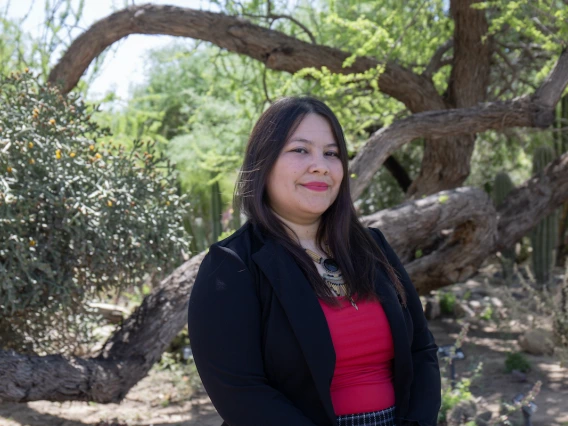
Romy Cerón Canché, a graduate teaching associate and Ph.D. candidate in the Department of Spanish and Portuguese, has received the university’s 2023 Graduate Student Peer Mentor Award.
The Graduate Student Peer Mentors Award recognizes outstanding graduate students who provide peer mentoring to other graduate students in order to help them persist towards their degree, progress in their program or engage in scholarly activities and achieve success within their program. The award includes $1,000 in University funds to further work within the recipient’s discipline.
Cerón Canché is a doctoral candidate in Spanish Literature and Cultural Studies who arrived at the University of Arizona in 2018, after earning her master’s degree from the University of Texas at El Paso and bachelor’s degree from the Universidad Autónoma de Yucatán, and distinguished herself immediately, wrote a group of faculty and graduate students in nominating her for the award. The formal department nomination came from Professors Faith Harden, Director of Graduate Studies, and Mónica Morales, and graduate students in Spanish.
“From the very beginning, Romy has been an exemplary student and colleague, with a strong drive to explore every facet of professional life in our field and to support her peers with insights based on her experiences,” they wrote. “Romy's peer mentorship spans the breadth of academic and professional development, and embodies our university values of integrity, compassion, exploration, adaptation, inclusion, and determination.”
Cerón Canché has devoted tireless efforts to mentoring her peers, which is particularly visible in three distinct areas: her role as Senior Assistant Editor of the Arizona Journal of Hispanic Cultural Studies; her co-organization of a large graduate student conference; and her founding role in the creation of the Literature and Cultural Studies Working Group, Literatos.
“I cannot imagine what graduate school would have been like without Romy’s hard work, friendship, and vision but can only say I know it would have been a much more solitary experience,” wrote one Literatos group member.
“For two years, the pandemic was an extremely difficult time for graduate students and professors; nevertheless, thanks to this group, many of us were able to find a space in which we could refine our academic skills as well as share our perspectives as students. Romy played in a key role in this, as she organized workshops, invited outside speakers, and connected with our professors to invite them to participate in our activities. This created a truly excellent space of intellectual companionship and exchange for all of us,” another wrote.

